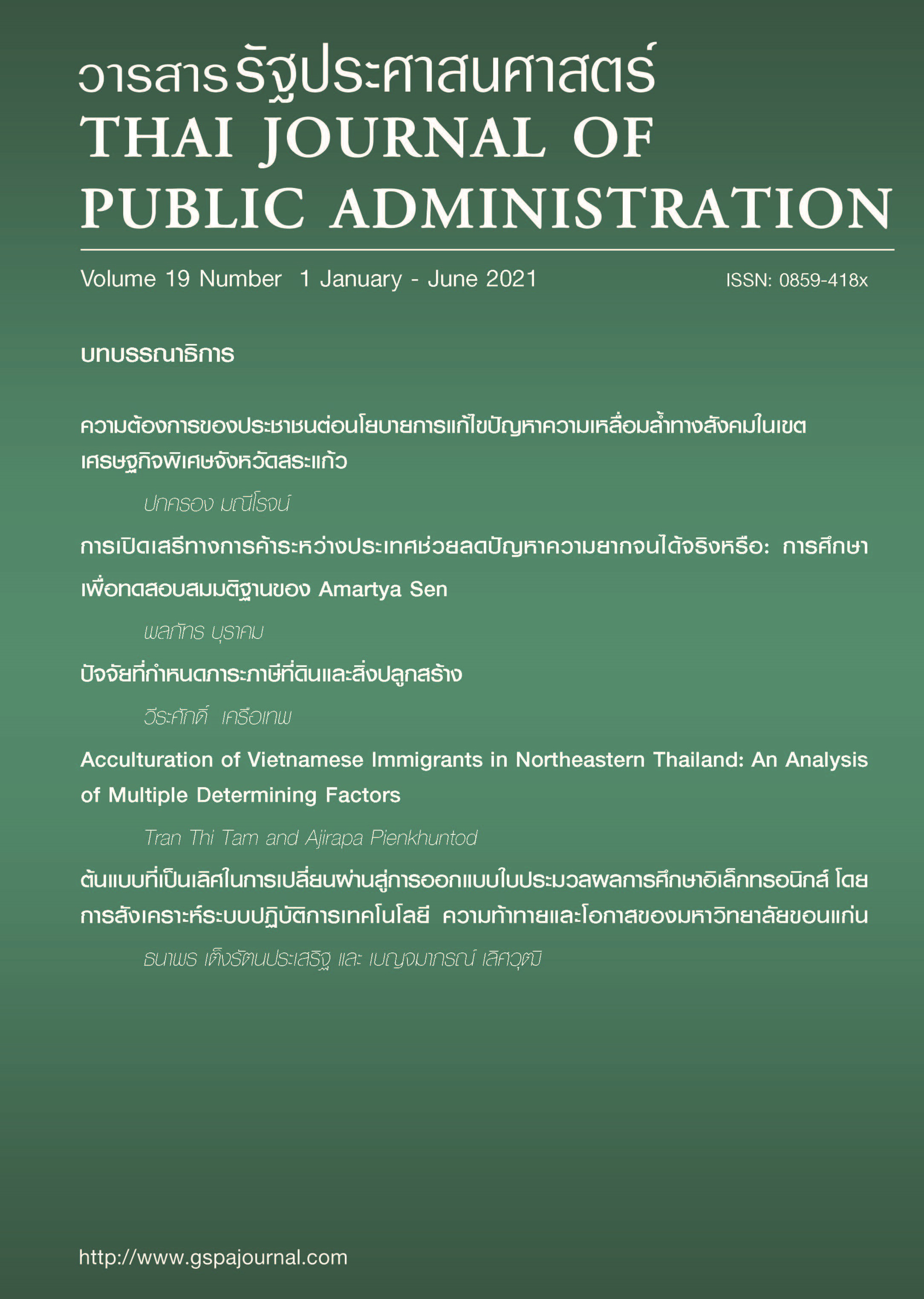Best Practice of e-Transcript Transformation: a Synthesis of the State-of-the-Art Processing Operations, Challenges and Opportunities of Khon Kaen University
Keywords:
Issuing e-transcripts, issuing electronic government documents, financial analysis, e-transcript ecosystem, Khon Khan UniversityAbstract
This study reveals the concepts, challenges, and opportunities related to e-transcript transformation in Khon Khan University to serve as a model for utilizing digital technologies to manage information systems for issuing digital documents. The electronic documents' issuance is considered an essential aspect of the complete procedure of providing electronic services by public sectors. The important aspect is not only the creation of documents but also the whole process of documentation and selecting appropriate digital technologies for each procedure. This research paper aims to illustrate the connection between public information management and the information system, which play an essential role in mixed methodology research studies. The results of this study reveal essential factors that contribute to the success of the operation, including the preparation of analog complements, such as the infrastructure, the culture of management in public sectors, regulatory guillotine, and allocating of essential resources for risk management. Besides, financial analysis is assessed in order to evaluate the university's preparation and potential to serve as a model university of developing into a digital organization and continue to serve as a model for further improvement. This study's results reflect the potential of digital systems in conserving resources, saving time, and optimally utilizing the national budget. Furthermore, these results could provide convenience to service receivers in terms of searching for data related to personal identification and connecting data within the organization and, more importantly, help reduce the burden of service receivers.
References
Barzelay, M., 2001. The new public management: Improving research and policy dialogue 3rd ed., Oxford: University of California Press.
Bhuasiri, W., Zo, H., Lee, H., & Ciganek, A. P. (2016). User Acceptance of e-government Services: Examining an e-tax Filing and Payment System in Thailand. Information Technology for Development, 22(4), 672-695.
Borins, S. F., Kernaghan, K., & Brown, D. (2007). Digital state at the leading edge. Toronto Buffalo London: University of Toronto Press.
Brown, A., Fishenden, J., Thompson, M., & Venters, W. (2017). Appraising the impact and role of platform models and Government as a Platform (GaaP) in UK Government public service reform: Towards a Platform Assessment Framework (PAF). Government Information Quarterly, 34(2), 167-182.
Creswell, J. W. & Plano Clark, V. (2011). Designing and Conducting Mixed Methods Research. 2nd ed. Thousand Oaks, CA: Sage.
Deloitte Access Economics. (2015). Digital Government Transformation. Sydney: Adobe Systems.
Dolowitz, D. P., & Marsh, D. (2000). Learning from abroad: The role of policy transfer in contemporary policy‐making. Governance, 13(1), 5-23.
Dunleavy, P., Margetts, H., Bastow, S. and Tinkler, J. (2006). New public management is dead—long live digital-era governance. Journal of public administration research and theory, 16(3), 467-494.
Dutil, P. A., Howard, C., Langford, J., & Roy, J. (2008). Rethinking government-public relationships in a digital world: Customers, clients, or citizens?. Journal of Information Technology & Politics, 4(1), 77-90.
Eisenhardt, K. M. (1989) ‘Building theories from case study research.’ Academy of management review, 14(4), 532-550.
Genesis, E.O. and Oluwole, O.N. (2018). Towards a “Paperless” Higher Education System in Nigeria: Concept, Challenges and Prospects. Journal of Education, Society and Behavioural Science, 1-15.
Golafshani, N. (2003). Understanding reliability and validity in qualitative research. The qualitative report, 8(4), 597-606.
Gopal, N., & Prakash, V. V. (2018). Survey on Blockchain Based Digital Certificate System. International Research Journal of Engineering and Technology (IRJET), 5(11), 1244-1248.
Hood, C. (1991). A public management for all seasons?. Public administration, 69(1), 3-19.
Kernaghan, K. (2013). Changing channels: Managing channel integration and migration in public organizations. Canadian Public Administration, 56(1), 121-141.
Klischewski, R., & Wetzel, I. (2002, January). Service flow management: caring for the citizen's concern in designing e-government transaction processes. In Proceedings of the 35th annual Hawaii international conference on system sciences (pp. 1637-1646). IEEE.
Jun, M. (2018). Blockchain government-a next form of infrastructure for the twenty-first century. Journal of Open Innovation: Technology, Market, and Complexity, 4(1), 1-12.
Lessig, L. (2000). “Code: And Other Laws of Cyberspace”, New York: Basic Books.
Moore, N. and Stokes, P. (2012) Elite interviewing and the role of sector context: an organizational case from the football industry. Qualitative market research: an international journal, 15(4), 438-464.
Nelson, R. R., & Nelson, K. (2002). Technology, institutions, and innovation systems. Research policy, 31(2), 265-272.
Onwuegbuzie. J.A. and Leech, L.N. (2005) ‘Taking the “Q” out of research: teaching research methodology courses without the divide between quantitative and qualitative paradigms.’ Quality and quantity, 39, 267-296.
Organisation for Economic Co-operation and Development (OECD). (2001). Understanding the Digital Divide. Paris: OECD Publishing.
Organisation for Economic Co-operation and Development (OECD). 2014. Recommendation of the Council on Digital Government Strategies. Paris: OECD Publishing.
Patton, M. Q. (2002). Two decades of developments in qualitative inquiry: a personal, experiential perspective. Qualitative social work, 1(3), 261-283.
Radaelli, C. M. (2000). Policy transfer in the European Union: institutional isomorphism as a source of legitimacy. Governance, 13(1), 25-43.
Ruengwit Ketsuwan. 2013. Karn Borihan Chudkarn Parkrat Naew Mai. [New Public Management]. Bangkok: Bophit Printing. (in Thai)
Thanaporn Tengratanaprasert, and Dhiyathad Prateeppornnarong. 2020. Karn Suksa Naw Thang Karn Prubtua Darn Digital Sumrab Parkrat Parkaekachon Lae Parkprachachon Pua Perm Prasitthiparb Karn Aumnuay Kwamsaduag Nai Karn Prakorb Turakit. [A Study of Digital Adoption in Public Sector, Private Sector, and Citizens to Effectively Facilitate Doing Business]. Bangkok: Office of the Public Sector Development Commission. (in Thai)
Thomas, G. 2013. How to Do Your Research Project: A Guide for Students in Education and Applied Social Sciences. 2nd ed. London: SAGE.
Wong, C.K. and Lam, S.S., 1998, October. Digital signatures for flows and multicasts. In Proceedings Sixth International Conference on Network Protocols (Cat. No. 98TB100256) (pp. 198-209). IEEE.



